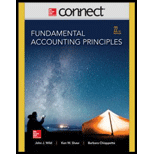
a)
Introduction:
Ratio Analysis
• Ratio analysis is a study of several key metrics of a company based on the data presented in its’ financial statements with an objective to evaluate the financial health of a company.
• It is essential for investors, stakeholders, government bodies etc. to evaluate the key metrics of an entity in order to ensure that the company fulfills the going concern principle and displays financial stability.
• Key metrics include ratios such as Net profit margin ratio, Asset turnover ratio, Return on Equity etc. These ratios are calculated on basis of the accounting estimates and policies that are followed by the entity.
To Determine:
A limitation of using ratio analysis when examining companies under different accounting systems such as IFRS versus U.S. GAAP.
b)
Introduction:
Analysis of financial statement
Financial statements are financial records of the entities transactions for a given reporting period and indicate the financial health of an entity. They comprise of:
- Income Statements and Notes to Income Statement,
- Statement of
Retained Earnings
- Statement of Shareholders’ Equity.
- Balance Sheets and,
- Cash flow statements.
• Income Statements and Notes to Income Statement record the results of the company’s operations during a particular reporting period and provide information about the sources of funds and expenses of an entity.
• Statement of Retained Earnings is an indicator of the change in the retained earnings i.e. the net earnings after all the expenses have been incurred and the balance of the incomes over expenses carried over to the next reporting period.
• Statement of Shareholders’ Equity is a statement detailing the breakup of the shareholders equity capital held in the reporting entity detailing the movement and changes in the same for a reporting period.
•
• Cash flow statements are a record of the
• Often companies having operations in different countries and geographies, prepare financial statements in different currencies in order to comply with legal requirements.
To Determine:
Advantage of horizontal and vertical analysis of multi-currency financial statements.
Want to see the full answer?
Check out a sample textbook solution
Chapter 17 Solutions
FUND.ACCT.PRIN -ONLINE ONLY >I<
- Miller Corporation purchased Elvis Enterprises for $750,000 cash. The fair market value of Elvis's assets was $640,000, and the company had liabilities of $45,000. What amount of goodwill should Miller Corporation record related to the purchase of Elvis Enterprises?arrow_forwardCan you please solve the following requirements on these accounting question?arrow_forwardcan you help me with this General accounting questionarrow_forward
- correct answer please subject- accountingarrow_forwardContribution margin isarrow_forwardIn the process of reconciling its bank statement for July, Summit Retailers compiles the following information: Cash balance per company books on July 31: $12,750 ⚫ Deposits in transit at month-end: $2,800 • Outstanding checks at month-end: $1,400 Bank service charges: $75 EFT payment automatically deducted monthly, not yet recorded: $950 • An NSF check returned to a customer account: $600 • What is the adjusted cash balance per the books on July 31? a) $11,325 b) $10,950 c) $11,125 d) $11,875arrow_forward

 AccountingAccountingISBN:9781337272094Author:WARREN, Carl S., Reeve, James M., Duchac, Jonathan E.Publisher:Cengage Learning,
AccountingAccountingISBN:9781337272094Author:WARREN, Carl S., Reeve, James M., Duchac, Jonathan E.Publisher:Cengage Learning, Accounting Information SystemsAccountingISBN:9781337619202Author:Hall, James A.Publisher:Cengage Learning,
Accounting Information SystemsAccountingISBN:9781337619202Author:Hall, James A.Publisher:Cengage Learning, Horngren's Cost Accounting: A Managerial Emphasis...AccountingISBN:9780134475585Author:Srikant M. Datar, Madhav V. RajanPublisher:PEARSON
Horngren's Cost Accounting: A Managerial Emphasis...AccountingISBN:9780134475585Author:Srikant M. Datar, Madhav V. RajanPublisher:PEARSON Intermediate AccountingAccountingISBN:9781259722660Author:J. David Spiceland, Mark W. Nelson, Wayne M ThomasPublisher:McGraw-Hill Education
Intermediate AccountingAccountingISBN:9781259722660Author:J. David Spiceland, Mark W. Nelson, Wayne M ThomasPublisher:McGraw-Hill Education Financial and Managerial AccountingAccountingISBN:9781259726705Author:John J Wild, Ken W. Shaw, Barbara Chiappetta Fundamental Accounting PrinciplesPublisher:McGraw-Hill Education
Financial and Managerial AccountingAccountingISBN:9781259726705Author:John J Wild, Ken W. Shaw, Barbara Chiappetta Fundamental Accounting PrinciplesPublisher:McGraw-Hill Education





